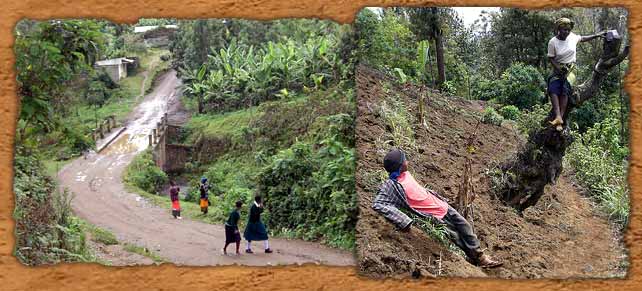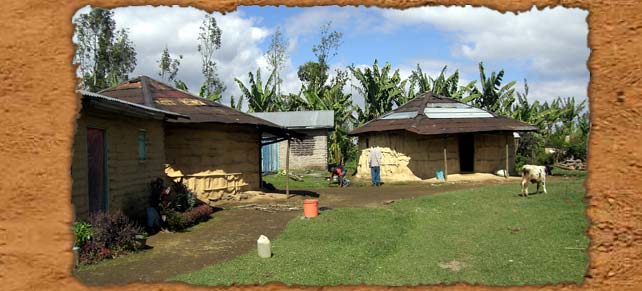|
|
Ng'iresi is situated 7 kilometers out of Arusha on the green and steep slopes of Mount Meru. The inhabitants of the village are all farmers of the Wa-arusha tribe. The Wa-arusha are family of the Maasai, but have gradually shifted from pastoralism to agriculture. Some Wa-arusha are still living in the traditional bomas, others try hard to build up stone houses; some still depend on their cows, others have cultivated large plots. The village perfectly shows the transition from traditional into modern African life. On the steep slopes agriculture is not an easy activity. If farmers don't take preventive measures, soil erosion takes place rapidly. Many farmers now have started to place contour lines and build terraces.
The irrigation system in the village further helps the farmers to increase their harvest. Some villagers even participate in other innovative projects, like a fish nursery, a biogas system and a cross breeding project.
All the activities take place on the magnificent slopes of Mount Meru, where small rivers race downhill cascading into impressive waterfalls. The volcanic activities of Mount Meru have created many small hills around Ng'iresi. Some of them easily can be climbed within an hour. From the top you have a beautiful view over the surrounding area.
Profits from your visit will be used to improve the Primary school at Ngiiresi. Thanks to your visit, the children on Ngi’iresi will get a better education. |
|
 |
Half day Tour
In the half day visit you will be welcomed with coffee and tea at Mzee Loti's farm and get an explanation about the biogas, crossbreeding and soil conservation projects on the farm. Next, you make a walk to some nearby bomas, where you can see the various styles of traditional Maasai and Wa-arusha houses. From there you start climbing Lekimana hill, from where you have a beautiful view over Arusha town and the surrounding Maasai plains. With clear weather Kilimanjaro is visible. You descend Lekimana hill on the other side, so that you can visit Ng'iresi primary school. Back at Mzee Loti's farm, you get a traditional meal cooked by the Juhudi women's group.
Day long Tour
The one day tour adds a visit to the catchment forest on the higher slopes of Meru. Here you can see the spring that is the main water source for the village. A few meters downstream the farmers are building an intake for the irrigation system. Groups with a special interest can plan a visit to a traditional healer at the edge of the forest. Further downhill a fish nursery is visited in the backyard of a farmer. The day is finished with a dinner at Mzee Loti's farm.
Traditional Medicine Tour
All tours to Ngi’iresi can include a visit to a traditional healer who is living in the area. However, visitors who are keen to learn more about the traditional medicine can spend a half or full day walking through the slopes of Mount Meru collecting herbs and plants that have been used by local people for 1000s of years. A sheet listing the various plants will be given with their Latin and common name in the local dialect. A special guide will help you identify and collect samples of the numerous medicinal species.
|
 |
Meals are prepared by the Juhudi women's group. The women can make various traditional African meals, but can serve western food as well. All meals will be prepared in a clean environment. The women's group has already cooked for the Ambassadors of Sweden and The Netherlands.
Facilities: At Mzee Loti's farm there is a simple but clean toilet, from the model pit latrine.
Conservation of the natural forest
We see the natural forest on top of Kivesi hill as an important natural resource for our village. It helps us preventing further soil erosion, forms an important refuge for the many birds in our village, is used for initiation ceremonies in the Wa-arusha culture and is also a nice attraction for tourists. We want to preserve this natural forest and therefore don't cut any trees in the natural forest.
Improving Ng'iresi primary school
Ng'iresi primary school was built in 1975. The school building consists of seven classrooms. In total 510 children attend the school. The classrooms are rather crowded and there are not enough learning materials for everyone. With the tourism programme we hope to generate funds that we can use for improving our primary school. From the money earned from the visit of every tourist, 4 US$ will go to a school development fund, used for improvements of the school. For one dollar two schoolbooks can be purchased; US$15 is enough for wood from which the children can make a desk and for ten dollars we can buy a large topographic map of our country.
|
For information on prices, please fill our enquiry form.
Simply fill our booking form for confirmed bookings!!
|
| |
 |
|
| |
|
|